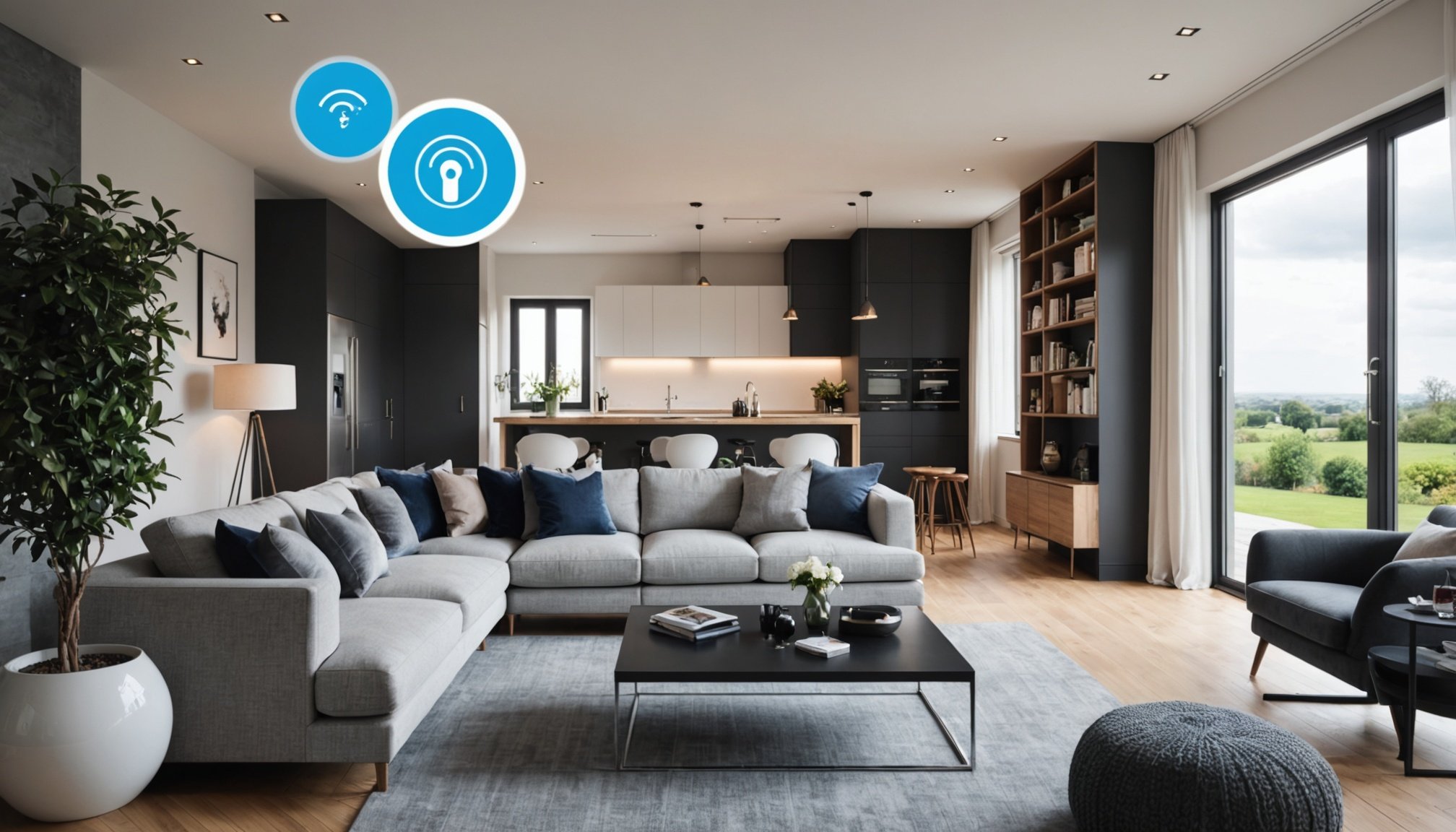Overview of Smart Home Technology Innovations
Smart home technology encompasses a range of connected devices aimed at enhancing the convenience, efficiency, and security of household environments. This advanced technology integrates various systems, allowing homeowners to control lighting, heating, security, and more through their smartphones or other devices.
Recent advances in smart home technology are transforming the real estate market. Properties equipped with smart systems are increasingly appealing to tech-savvy buyers. These features, from automated climate control to smart security systems, can significantly impact property value, making homes more attractive to potential buyers and increasing their market worth.
Have you seen this : How the UK”s Green Deal Impacts Homeowners: Key Insights for Residential Property Owners
Consumer trends strongly favor homes offering these innovations. There’s a noticeable shift towards features that enable energy efficiency, enhanced safety, and increased comfort. Smart home features are becoming standard in new developments, reflecting the growing demand among consumers who appreciate the convenience and savings these technologies offer.
As technology progresses, the interplay between smart home advancements and the real estate market is expected to strengthen, offering both homeowners and buyers a range of benefits. This intersection of technology and living spaces defines the future of homeownership and the evolving standards of modern living.
This might interest you : Unlocking the Latest UK Rules for Transforming Homes into Holiday Lets: A Comprehensive Guide
Key Smart Home Features Enhancing Property Worth
Smart home features are more than just tech novelties; they offer significant value addition to properties. Let’s delve into how these systems transform homes.
Energy Efficiency Solutions
Smart thermostats are a marvel in energy management, enabling homeowners to automate heating and cooling systems to match their routines. This optimisation not only leads to reduced energy costs but also ensures comfortable living conditions year-round. Further, smart lighting systems play a pivotal role in conserving energy by automatically adjusting brightness based on ambient light or occupancy, thus slashing unnecessary energy usage. For those who embrace clean energy, integrating renewable sources like solar panels into their home automation could further enhance efficiency and property value.
Enhanced Security Systems
Security forms a cornerstone of smart home technology. Smart security cameras offer high-definition surveillance, while alarm systems provide real-time alerts. These features collectively enhance neighborhood safety perceptions, attracting potential buyers. Smart locks with access control provide an added layer of safety, offering secure, keyless entry and the ability to monitor access remotely.
Home Automation Systems
Voice-activated assistants and interconnected devices shape the modern living space. They streamline daily tasks, suggesting a potential for heightened convenience to prospective buyers. These automation systems advocate an integrated lifestyle—appealing to those seeking an elegant seamless blend of technology and comfort.
Market Trends and Consumer Demand
In recent years, market trends in the UK have shown a significant shift towards smart homes, driven by evolving consumer preferences. The rise in smart home technology can be attributed to the desire for convenience, energy efficiency, and enhanced security. According to recent statistics, approximately 57% of UK households are expected to have at least one smart home feature by 2025. This shift highlights a growing consumer demand for smart features that effortlessly integrate into daily life.
Consumer preferences are increasingly leaning towards devices that offer compatibility with various ecosystems, such as voice assistants and smartphone control. Among the most sought-after smart features are smart lighting, heating controls, and security systems. These preferences not only simplify household management but also contribute to cost savings through increased energy efficiency.
Looking forward, long-term market predictions suggest that as the popularity of smart homes continues to grow, properties equipped with these technologies may see a boost in market value. Homebuyers and renters are anticipated to place a higher premium on properties that include integrated smart home solutions, thus driving up demand. As technology advances, this trend is expected to bolster the market further, ultimately influencing property values across the UK.
Return on Investment for Smart Home Upgrades
Investing in smart home upgrades can significantly affect the Return on Investment (ROI) and increase the overall value of a property. Homeowners often contemplate the balance between initial costs and the potential increase in property value post-renovation. This consideration is crucial as technology advancements redefine the standards of modern living spaces.
Cost-Benefit Analysis
Conducting a cost-benefit analysis is a vital first step. It involves comparing initial investment costs against long-term savings. For instance, installing energy-efficient appliances and smart thermostats can substantially reduce utility bills. It’s essential to examine property appraisal trends following a smart home conversion. Often, properties equipped with smart features appraise higher, reflecting the increased market demand for such innovative homes. Comparing neighborhoods can further spotlight how smart upgrades contribute to a property’s increased value. Areas with a higher adoption rate show a marked uplift in real estate values, thanks to these enhancements.
Case Studies of Successful Implementations
Successful cases throughout the UK underscore the value increase linked to smart home improvements. Homes integrated with advanced technologies like automated security systems and intelligent lighting often achieve higher sale prices, illustrating the financial gains of these innovations. Homeowners reveal that significant planning and understanding of market trends are pivotal to maximizing the potential return on their investments in smart technology.
Practical Tips for Homeowners
For those venturing into the world of smart technology, selecting the right solutions is crucial. Begin by evaluating your home’s current infrastructure and identifying specific needs. This is your blueprint for implementing a strategy that integrates seamlessly with your lifestyle. Engage with resources that provide comprehensive comparisons between different technology types to make an informed decision.
Budgeting for smart home renovations requires a balanced approach. Consider both the initial costs and the potential energy savings over time. While the allure of cutting-edge gadgets is strong, ensuring that your selections offer tangible benefits—such as enhanced security or increased efficiency—will affirm their value. Keep in mind that some homeowner’s guide to financing options might include instalment plans or green energy grants.
When it comes to installation, professional assistance can often be invaluable. While many systems boast user-friendly designs, qualified experts ensure that your smart technology setup operates optimally. Resources such as online forums, tutorials, and even local workshops can provide supplementary support. Embracing these practical measures will empower homeowners to create a living space that is not only advanced but also tailored to their specific needs and preferences.











